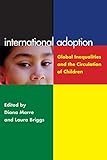International Adoption : Global Inequalities and the Circulation of Children / Laura Briggs; ed. by Diana Marre.
Material type: TextPublisher: New York, NY : New York University Press, [2009]Copyright date: ©2009Description: 1 online resourceContent type:
TextPublisher: New York, NY : New York University Press, [2009]Copyright date: ©2009Description: 1 online resourceContent type: - 9780814791011
- 9780814764473
- 362.734 23
- HV875.5 .I573 2016
- online - DeGruyter
| Item type | Current library | Call number | URL | Status | Notes | Barcode | |
|---|---|---|---|---|---|---|---|
 eBook
eBook
|
Biblioteca "Angelicum" Pont. Univ. S.Tommaso d'Aquino Nuvola online | online - DeGruyter (Browse shelf(Opens below)) | Online access | Not for loan (Accesso limitato) | Accesso per gli utenti autorizzati / Access for authorized users | (dgr)9780814764473 |
restricted access online access with authorization star
http://purl.org/coar/access_right/c_16ec
In the past two decades, transnational adoption has exploded in scope and significance, growing up along increasingly globalized economic relations and the development and improvement of reproductive technologies. A complex and understudied system, transnational adoption opens a window onto the relations between nations, the inequalities of the rich and the poor, and the history of race and racialization, Transnational adoption has been marked by the geographies of unequal power, as children move from poorer countries and families to wealthier ones, yet little work has been done to synthesize its complex and sometimes contradictory effects.Rather than focusing only on the United States, as much previous work on the topic does, International Adoption considers the perspectives of a number of sending countries as well as other receiving countries, particularly in Europe. The book also reminds us that the U.S. also sends children into international adoptions-particularly children of color. The book thus complicates the standard scholarly treatment of the subject, which tends to focus on the tensions between those who argue that transnational adoption is an outgrowth of American wealth, power, and military might (as well as a rejection of adoption from domestic foster care) and those who maintain that it is about a desire to help children in need.
Mode of access: Internet via World Wide Web.
In English.
Description based on online resource; title from PDF title page (publisher's Web site, viewed 01. Nov 2023)


